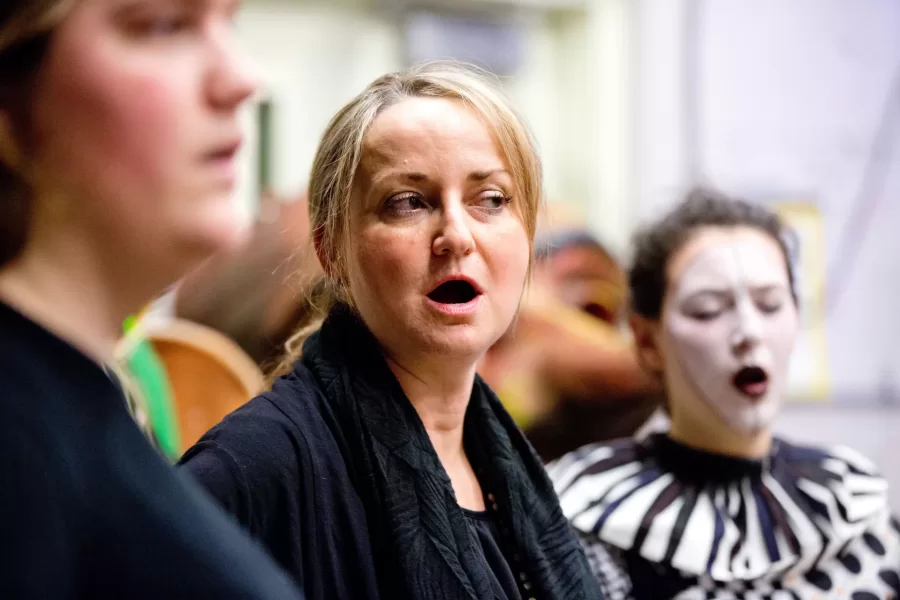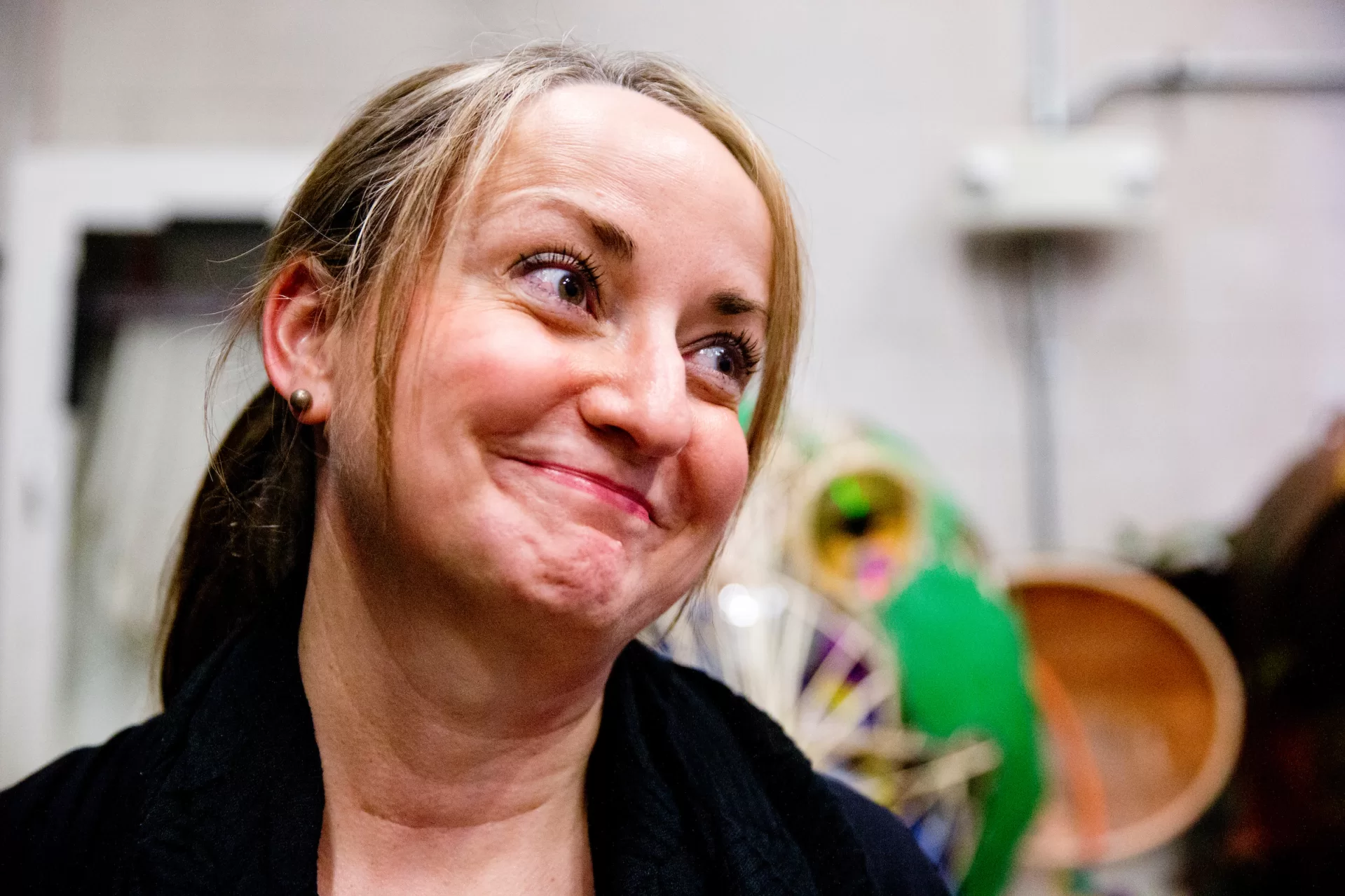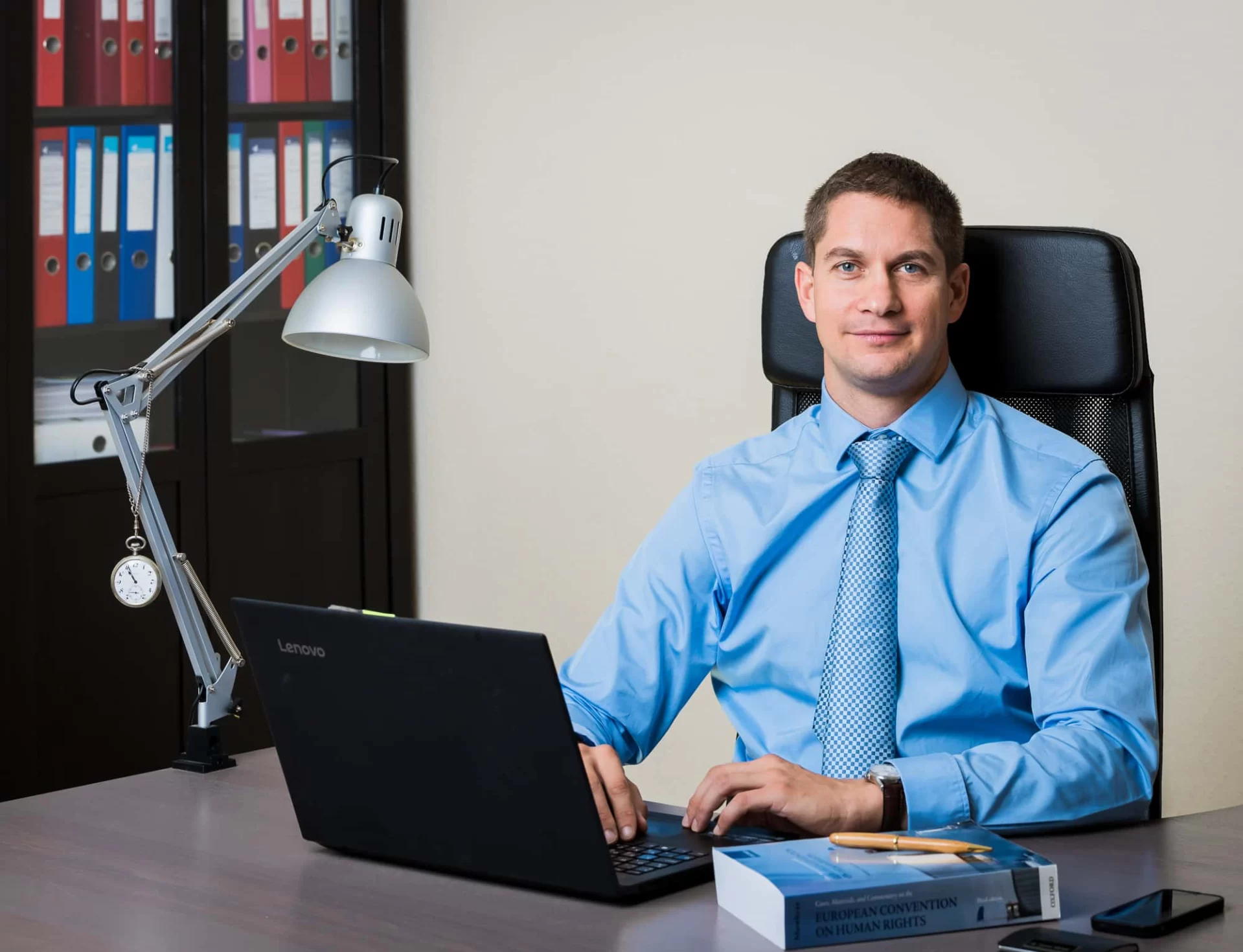At the end of November, Dániel Karsai will travel from his home in Budapest, Hungary, to Strasbourg, France, where he expects to have a few days of great fun.
He will see old friends, watch a soccer match between Strasbourg and Marseilles, and dine on good Alsatian food.
And while there, Karsai, who is a human rights lawyer, will argue a case before the European Court for Human Rights — with help from a Bates faculty member — that is literally about life and death: whether Karsai has the legal right to end his own life.
Even that part of his trip — arguing the case Karsai v. Hungary for his right to die — will be fun to Karsai, because it means he still can feel alive, still can do what he loves to do.
Karsai has amyotrophic lateral sclerosis, or ALS, an incurable, progressive, and fatal neurological disease that is slowly robbing him of his ability to control his muscles, including his ability to speak. He wants the right to die before he becomes completely incapacitated, stripped of his dignity.
For more information: Karsai v. Hungary
The European Court for Human Rights offers information about the Nov. 28–29 case involving Dániel Karsai’s request for the right to die with dignity. All hearings are available for viewing, on on-demand and delayed.
In Hungary, assisted death is a crime, so Karsai is appealing to the ECHR, which will hold a hearing Nov. 27–28. The hearing will be conducted in English, one of the court’s two official languages, French being the other, so Karsai knew he needed help to deliver his personal statement, both with English words that are difficult for a Hungarian to pronounce and help to contend with how the disease is ravaging his speaking ability.
So he turned to a fellow Hungarian who is a Bates faculty member: Kati Vecsey, a senior lecturer in theater, vocal director for all Bates theater productions, and a noted speech and language pathologist and therapist.
A member of the Bates faculty since 1996 and currently chair of the Department of Theater and Dance, Vecsey earned a doctorate in developmental and educational psychology from Eötvös Lóránd University in Budapest.
At Bates, Vecsey teaches courses, has served as vocal director for well over 100 theater productions, was the long-time adviser of the student Robinson Players theater club, and is widely published in her field. Well known in Hungary for her voice work, she was awarded the Farkas Kempelen Plaque Award from the Hungarian Association of Phonetics, Phoniatrics and Logopedics for research and professional contributions to her field.

Sometimes, the goal of Vecsey’s voice teaching is to train someone’s voice toward something different, whether helping a theater student adopt a British accent or helping someone transform their very identity. In the early 2000s, for example, she worked with author and then-Colby professor Jenny Boylan in her transition to becoming a woman by helping Boyle achieve an optimal pitch and varied inflection.
With Karsai, the goal is to help him be the best Daniel Karsai possible, vocally speaking, for as long as possible. “My work with Daniel is not different from what I do during voice coaching with actors,” Vecsey says. “I work to nurture the confidence and self-reliance — so vital to create the optimum conditions for spontaneous, truthful, and healthy expression.”
Karsai is no stranger to the European court, having worked there for four years in the mid-2000s, helping to prepare more than 1,000 draft decisions in English and in French. Since 2011, he has run his own law office in Budapest dealing with constitutional law and human rights issues.
For now, Karsai uses a wheelchair but is still able to go to work at his law firm each day. Before his illness, his English was already quite good, in terms of his vocabulary, grammar, and sentence structure. But his speech is now slower and slurred due to an ALS-related condition known as dysarthria that Vecsey studied during her training.

“The muscles become weak and tight, limiting tongue and/or jaw movement,” she explains. Swallowing is difficult, leading to a build-up of saliva in the mouth, and “he has developed hoarseness and sounds more nasal than before his illness.”
As an example of Karsai’s very good English, here’s a nearly verbatim text of how Karsai describes the first few months after receiving his ALS diagnosis in August 2021.
“After the death sentence, I needed four months to take my s–t together. I’m sorry. Really, the first four months after I received the diagnosis, 25 August last year, I suffer from depression and anxiety, I mean in a medical sense. And with the help of amazing psychiatrist, and the medicines that were necessary, by the end of December, I find back to the light. And then I could restart to live, not just fighting with this situation.”
Neither Vecsey nor Karsai is particularly worried about his accent. “We Hungarians have a terrible accent, even if we are not ill,” he jokes. And, he adds, few people who speak before the ECHR are native English speakers. “You hear many accents. So it’s not strange.”
For Hungarians, difficult sounds to pronounce in English words include the W sound in “what” or the TH sound in “teeth” or “three,” “where you put your tongue between bottom and upper teeth, that’s a lisp in Hungarian, and you get sent to speech therapy.”
Overcoming an accent is a great challenge, she says, because an accent is integral to a person’s physiology. Getting rid of one is not the same as putting one on, like Meryl Streep using a Polish accent in Sophie’s Choice.

“Your entire mouth develops around the formation of sounds for your primary language,” Vecsey says. “So when you learn a second language, you will have difficulty.”
Knowing Karsai’s voice before ALS is a key concept, says Vecsey. “The knowledge of a ‘healthy voice’ is very important because you are not trying to teach a person something new, but what they know but are having difficulty doing.”
Appearing on a Hungarian talk show four years ago, looking fit, relaxed, and strong, Karsai speaks in a measured and calm voice with subtle inflections. Now, Vecsey is helping him manage pitch, tone, rhythm, and volume. “You can hear that his voice is already strained.”
Using her theatrical chops, Vecsey is also coaching Karsai on his performance. He has appeared before the court several times, and will be reading from a prepared text. “So it’s not alien for me,” he says.
“Generally it’s much harder to think and speak at the same time in a foreign language in a high-tension situation. This hearing is really like in the movies: full courtroom, big media attention,” including a documentary film team from Hungary that is capturing his story. “And so I would say the psychological part is the most difficult one.”
During our interview, Karsai jokes about wearing his jiu jitsu robe to the hearing. Vecsey ran with it, thinking theatrically: Maybe not the robe, she said, but perhaps he could wear his brown belt around his neck.
Dániel Karsai appears on a Hungarian talk show four years ago, prior to his ALS diagnosis.
His approach is “practice, practice, practice. My sensei, my master, always said that if you can do something with 130 percent perfection in practice, in real-life situation that will be 80 or 100 percent. So this is what I try to achieve, practice as much as possible, and then I can perform well.”
And if he makes a mistake, “Who cares? So what? I correct myself and go on. So I should not be afraid of making mistakes. Everybody will think that this is the illness, not my weak English that made the error.”
To which Vecsey quickly interjects a friendly jab: “You’re telling me that you’re hiding behind your illness now when it comes to English?!” Indeed, the warmth between the two Hungarians comes through. “Daniel is a genuinely fine human being: charismatic, compassionate, and great character and integrity. And a fantastic sense of humor.”
Vecsey and Karsai have been meeting on Zoom weekly since summer. (He is also working with two other speech and language pathologists in Hungary.) “We have fun conversations, and I try to evaluate his speaking skills, ask questions about what he feels when he speaks, and give him feedback and suggestions.”
“This public fight gives me strength because I enjoy it. I enjoy this conversation because we are discussing an issue which intellectually gives me passion and strength.”
Dániel Karsai
“Fun” might not be anyone’s idea of what Karsai is having these days, but the word comes up more than a few times during our interview. For Karsai, the capacity to still have fun — to do what he loves doing, to have dignity, to feel purposeful — is what it means to have a life still worth living. The capacity to have fun is one measuring stick for being human.
And for Karsai the human rights lawyer, mounting a major legal battle against what he feels is an unjust law is a blast. “This public fight gives me strength because I enjoy it. I enjoy this conversation because we are discussing an issue which intellectually gives me passion and strength,” he says over Zoom. “I even feel much less tired than one hour ago.”
Published on Nov. 20, 2023, this brief video shows Dániel Karsai two years ago during his jiu-jitsu training and brown belt ceremony, and recently as he tries to get up from the ground.
The European Court for Human Rights hears cases brought against its 46 member states for alleged human rights violations, and its rulings are binding and are considered to have a significant impact on the interpretation and application of human rights law in Europe.
The case Karsai v. Hungary is not complicated. In Hungary, it is a criminal offense to help someone end their life. (In the U.S., 10 states and the District of Columbia allow assisted death, including Maine.) Karsai is asking the court to consider this a violation of the European Convention on Human Rights, on which the court bases its rulings. (Currently the “right to a death in dignity is not formally recognized” by the convention.)
What is complex is the court’s potential judgment. “A positive judgment could have different levels,” he explains, since the court is looking at three ways Hungarian law might violate the European Convention. “How far the court goes in the very complex issue of end of life decisions, we don’t know. We will see, and then the Hungarian state has to execute it somehow.” (A decision date is not known; however, the court has thus far granted the case priority.)

Speaking for himself, Karsai says that he would “be very happy if we could talk about the concrete measures that the Hungarian state must do after a positive judgment. That would be a huge victory for us. And especially because it is almost sure that there will be other applicants from Hungary, people who are dying but don’t have the time and energy to go to the court because they can barely go to the bathroom.”
Though he will be supported during the hearing by legal colleagues who will help him present the case, Karsai’s participation is much more than ceremonial.
“And my firm view is that in this situation, flowing from the right to dignity, everybody should have a right to finish their life in a dignified manner.”
Dániel Karsai
“Even if I’m terminally ill, I can show up and I can give real context to this question. It won’t be a theoretical issue for the court. It will be a living issue,” he says.
“I always say that this human rights issue concerns 8 billion people on the planet. My personal story shows it very well because two years ago I was a semi-professional sportsman. I did jiu jitsu at a high level; I reached brown belt, which is something, believe me. Now, I can barely go out to the toilet alone, which is five meters from here.
“It’s everybody’s problem — everybody will pass away one day, and it can happen. It can be the situation that happens after an undignified phase of life, which can last even for years. And my firm view is that in this situation, flowing from the right to dignity, everybody should have a right to finish their life in a dignified manner.”
He is clear that he knows where he is now and where he is headed. “For the time being I have a happy life, but with big f—ing difficulties,” he says.
“But I have a happy life. But it can disappear. Now I can speak. Maybe in a year I won’t be able to speak at all and I won’t be able to go to a football game because I will be stuck to a bed. I can eat now, but maybe in a year I won’t be able to eat, just through a feeding tube. This is not fun. For the time being, I have a good life and I’m lucky because of that. This is why I say I am not a hero. I receive strength for this and I’m lucky.”


